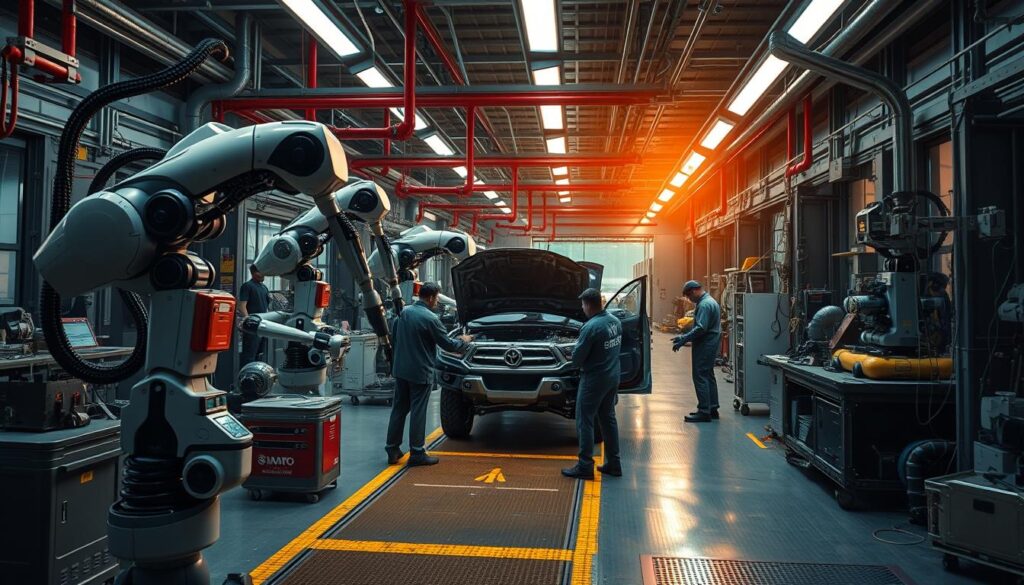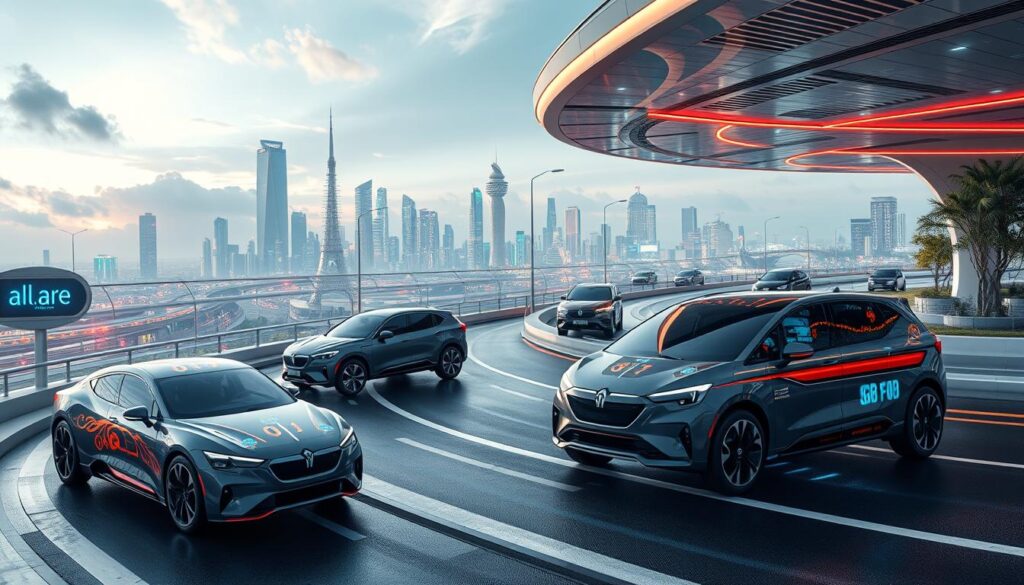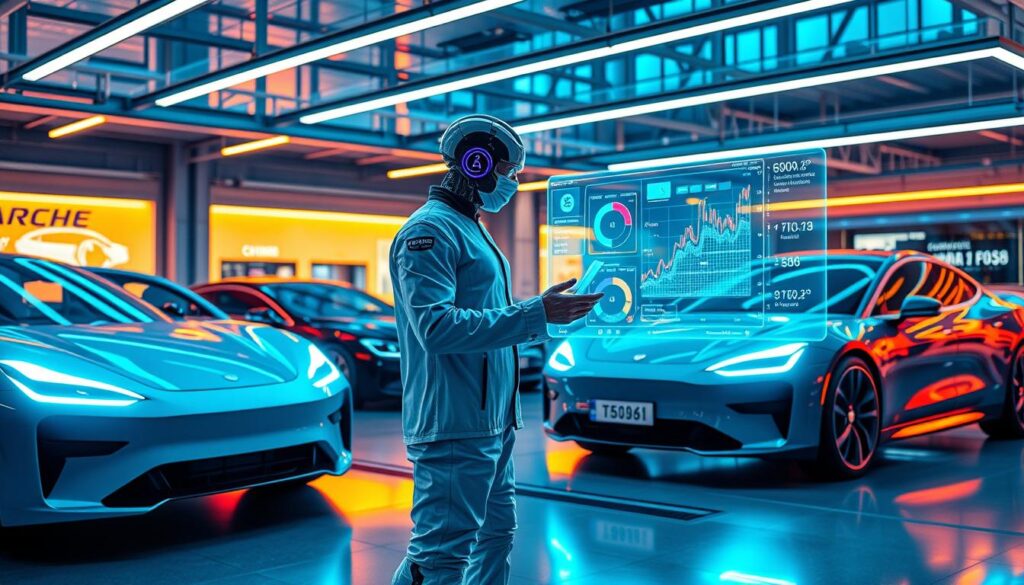The AI agent for automotive sector is leading a big change in cars and transport. Tools like Toyota’s E-Care AI Agent show this impact. They help by catching problems early, making service plans, and giving dealers important car info. This makes dealing with cars smoother for everyone.
Autonomous vehicle AI technology moves the car industry forward. It opens up new possibilities for how cars talk to each other, predict needs, and serve customers better. AI and cars working together make things better, keep customers happy, and make business smoother.
AI agents make a real difference in cars. Reports by McKinsey show AI cuts down time to make car parts by 10-20%. What’s more, studies by IDC and Microsoft see a 71% use of AI now, with a 22% increase soon. This has boosted happiness for customers and work output by 18% leading to a huge $3.5 return for every dollar spent. The money in this market is going up fast, showing AI’s big role in cars.
Key Takeaways
- AI agents streamline automotive processes, leading to significant increases in operational efficiency and customer satisfaction.
- Toyota and Cognigy’s collaboration highlights the innovative solutions emerging from the adoption of AI technology in the automotive sector.
- Generative AI could notably reduce automobile part development timelines, enhancing the sector’s dynamism.
- Investment in AI technology within the automotive industry yields substantial financial returns and marked productivity gains.
- As AI adoption grows exponentially, the revenue influence, showroom appointment rates, and sales are witnessing substantial growth.
- Leading companies such as NVIDIA are facilitating this transformation through technologies like NVIDIA AI, Omniverse, and accelerated computing.
- Generative AI is pivotal in creating cost-efficient, customer-centric, and safer automotive experiences.
Understanding AI Agents in the Automotive Industry
AI agents are changing the artificial intelligence in automotive industry greatly. They come in many forms, like chatbots and virtual assistants, changing the way we interact with vehicles. They make operations smoother and customer service better, playing a key role in the industry’s growth.
Definition of AI Agents
AI agents in cars are systems with AI that can do tasks on their own or with little help. These include chatbots and driver-assistance tech, making vehicles smarter and more responsive.
Role of AI in Automotive Innovation
Artificial intelligence in the automotive industry leads many new innovations. It makes self-driving cars better and helps virtual assistants and chatbots provide top-notch customer service. AI’s influence is vast and meaningful.
For example, Waymo and Zoox are advancing in making cars drive themselves. Waymo’s cars have driven 20 million miles on their own. At the same time, virtual assistants are changing how we get customer service, making AI a must-have for the industry’s success.
| Company | AI Application | Impact |
|---|---|---|
| Waymo | Autonomous Driving | 20 million miles driven autonomously |
| Zoox | Robotaxi | First robotic ride with passengers on public roads |
| Motional | Self-driven Rides | Over 100,000 rides with zero at-fault incidents |
| General Motors | Intelligent Route Planning for EVs | Enhanced driving experience reducing range anxiety |
These advancements show why investing in AI is crucial. The future looks bright for AI in automotives, promising even more innovations. It’s a big part of what makes the automotive companies successful.
Key Applications of AI Agents in Automotive
AI is changing the game in the automotive sector. It’s doing more than helping out; it’s leading the charge in making cars smarter and keeping customers happy.
Autonomous Driving Systems
AI is a game-changer for self-driving cars. It makes cars smarter about safety and getting around. With AI, cars can make quick decisions and handle tough roads better, making driving safer and less stressful.
Predictive Maintenance
AI is also amazing at predicting car troubles before they happen. This smart guesswork can save time, extend a car’s life, and cut down on repair bills. It makes keeping cars running smoother, for longer, easier and cheaper.
Customer Experience Enhancement
AI is making talking to customers smoother through smart chatbots. These bots chat instantly, dealing with questions and sales fast and in a personalized way. This not only makes buying easier but also keeps customers coming back by offering them tailored services.
AI’s rapid growth in making cars, serving customers, and driving safely shows how much the auto industry relies on it. It’s changing everything from how cars are made and sold to how they’re driven and maintained. AI is truly driving the future of cars.
Benefits of Implementing AI Agents
The use of AI technology in the automotive sector is game-changing. It brings improved efficiency, cost savings, and new safety features. Let’s look at how AI is pushing the car industry forward with the benefits of artificial intelligence in automotive.
Increased Efficiency
AI boosts efficiency in the car industry like never before. Big car makers use AI for various tasks. This includes robotics on assembly lines and real-time car diagnostics. By doing this, they make their work quicker and reduce mistakes, leading to better products faster.
Cost Reduction
Using AI agents in cars cuts costs significantly. It makes routine jobs more precise and less costly. Companies see up to a 30% cut in making cars. They also produce 40% more, using resources better and creating less waste.
Improved Safety Measures
AI improves safety in car design and how cars work. Cars with AI can avoid accidents by reacting to traffic and obstacles quickly. This not only makes roads safer but could also ease city traffic and lower crash rates.
In the end, bringing AI into the car industry makes it stronger, more efficient, and safer. These changes lead to better performance and safety, showing us the future of car technology.
Challenges in Adopting AI Agents
The automotive industry sees AI as a game-changer. However, deploying AI comes with big challenges in AI deployment. Issues like data privacy and tech limitations must be solved to use AI fully. These hurdles are key in adapting AI in cars.
Data Privacy Concerns
Data privacy is huge when cars start to think. AI in cars means dealing with lots of personal info. The fear is real that this info might get stolen. So, strong protection and clear rules on data use are essential for safety and trust.
Technological Limitations
AI agent for automotive sector restrictions also come from tech limits. AI might not always get human behavior or unexpected road issues right. These drawbacks limit how useful AI can be for driving on its own or for predicting car problems. We need more tech breakthroughs to get past these issues.

Leading Companies Using AI Agents in Automotive
The automotive sector is seeing big changes because of autonomous vehicle AI technology. Major companies like Tesla, General Motors, and Toyota are using AI. They’re making vehicles smarter and more autonomous.
Tesla’s AI Innovations
Tesla is leading the way in changing the car industry with AI. Its technology powers self-driving cars and improves the in-car experience. Tesla’s smart navigation and safety features show how AI can make cars better and safer.
General Motors’ Autonomous Initiatives
General Motors is fully embracing AI in making and running cars. They’re using cutting-edge AI to stay ahead in the fast-changing car market. Their work ranges from making cars to developing self-driving abilities, showing a complete use of AI.
Toyota’s AI Research Efforts
Toyota is focused on AI research to improve all parts of car technology. They’re working on smart maintenance systems and AI features to help customers. Toyota aims to use AI to make cars more reliable and centered on users.
Moreover, these companies lead in innovation, safety, and efficiency. This table shows how Tesla, General Motors, and Toyota use AI in different areas:
| Company | AI Initiative | Key Focus Area |
|---|---|---|
| Tesla | Autonomous Vehicle Operations | Enhanced Navigation and Safety |
| General Motors | Comprehensive Autonomous Integration | Manufacturing and Vehicle Operation |
| Toyota | AI Research and Development | Maintenance and Customer Service |
The work of these top companies on autonomous vehicle AI, Tesla AI, and General Motors’ autonomy shows a big change. This shift is making cars not just self-driving. It’s also changing how we see and use transportation.
Future Trends of AI in the Automotive Sector
The automotive industry is on the brink of major changes, thanks to AI. Looking ahead, future automotive AI trends will deeply change how we make and use cars. They will also change how cars connect with tech like the Internet of Things (IoT).

Integration with IoT
The integration of AI with IoT is changing car tech. Cars are now becoming part of a bigger network. They connect through the Internet of Things. This change makes cars smarter. It allows for features like predictive maintenance. This means cars can fix problems before they happen, saving fuel and improving performance.
The Rise of Electric Vehicles
The rise of electric vehicles powered by AI is shaping tomorrow’s transport. Brands like Tesla and Volvo lead by using AI to improve battery life and save energy. These electric cars learn what drivers like. They use energy smarter and even work with home energy systems. This is making transport more sustainable and smart.
AI is making vehicles more connected and electric. It’s raising the bar for safety, efficiency, and how we interact with cars. This marks a big leap in how the automotive sector operates.
Conclusion: The Future of AI in Automotive
The automotive industry is on the edge of big changes. Artificial intelligence (AI) is leading these changes. We can already see AI’s big impact. It has made supply chains better and quality assurance stronger with computer vision. AI has also made driving safer with new tech like adaptive cruise control.
These changes do more than just make things convenient. They make cars more efficient and safer. We’re talking about things like voice assistants, car maintenance that can predict problems, and cars that drive themselves. All of these are becoming part of our world.
The Importance of Continuous Innovation
Looking at AI solutions in cars, it’s clear that innovation must keep going. It’s essential for growth and meets important needs like safety and caring for our planet. Cars that drive themselves can cut down on accidents caused by people making mistakes. Electric cars can use energy in smarter ways. All this shows how crucial AI is for moving forward.
But, as driving gets more complex, we need to keep up with tech like machine learning. This includes tech that helps computers see like we do and understand human language. The car industry must keep pushing into these advanced areas.
Enhancing Collaboration and Development
For progress to continue, working together in AI and car development is key. The car industry is putting more into AI. This helps build a good relationship with tech companies. Working together helps tackle the big costs and complexity of using AI. This makes it easier for everyone to benefit from AI tech.
The dream of cars talking to each other and driving themselves is getting closer. This could make mobility smoother and roads more efficient. As car makers and tech leaders come together, they share one goal. They want to use AI to bring about a future with safer, more efficient, and user-friendly cars.



